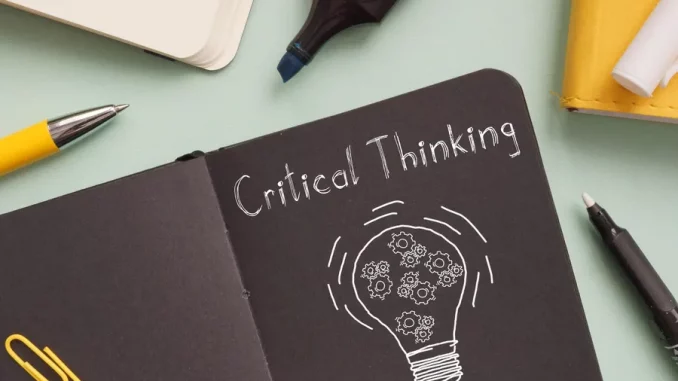
Welcome to our blog, where we dive into the fascinating world of critical thinking and explore strategies for fostering independent thought. In today’s fast-paced and information-saturated society, it has become more important than ever to cultivate the ability to think critically and make informed decisions.
Critical thinking is not just about analyzing information or solving problems; it is a mindset that empowers individuals to question assumptions, challenge biases, embrace diverse perspectives, and seek out creative solutions. By honing these skills, we can navigate through complexity, adapt to change, and thrive in an increasingly complex world.
So how do we nurture this invaluable skill? Join us as we uncover five effective strategies that will help you foster independent thought in yourself or those around you. Let’s embark on this journey together as we unlock the power of critical thinking!
Encourage Questioning
Encouraging questioning is a fundamental strategy for cultivating critical thinking and fostering independent thought. By creating an environment that values curiosity and inquiry, we can empower individuals to challenge the status quo, explore different perspectives, and delve deeper into complex issues.
When we encourage questioning, we open up opportunities for exploration and discovery. Instead of accepting information at face value or relying on assumptions, individuals are encouraged to ask “why?” and seek evidence-based answers. This not only enhances their understanding but also helps them develop analytical skills as they critically evaluate the validity of the information presented.
Questioning also promotes active engagement with the subject matter. Rather than passively receiving information, learners become active participants in their own learning process through asking thoughtful questions. This type of engagement fosters deeper connections with the material and encourages individuals to take ownership of their learning journey.
Furthermore, encouraging questioning nurtures problem-solving abilities. When faced with a challenge or dilemma, individuals who have developed strong critical thinking skills will automatically start asking relevant questions to identify possible solutions or alternative approaches. This iterative process allows for creative problem-solving strategies that go beyond traditional methods.
In addition to individual growth, encouraging questioning also benefits group dynamics by promoting collaboration and diverse perspectives. When people feel comfortable sharing their thoughts and ideas openly without fear of judgment or ridicule, it creates an inclusive environment where everyone’s input is valued. Through robust discussions fueled by thoughtful questions from various viewpoints, new insights emerge that may not have been discovered otherwise.
In conclusion (not conclusive), nurturing a culture that encourages questioning sets the stage for developing independent thinkers who are capable of challenging assumptions, exploring diverse perspectives creatively solving problems effectively collaborating with others.. Embracing this strategy paves the way towards a society equipped with analytical minds ready tackle complex challenges head-on!
Embrace Diverse Perspective
Embracing diverse perspectives is a crucial aspect of cultivating critical thinking skills. When we open ourselves up to different viewpoints, we are able to challenge our own assumptions and broaden our understanding of the world around us.
One way to embrace diverse perspectives is through exposure to a wide range of sources and voices. This could involve reading articles or books written by authors from different cultural backgrounds, engaging in discussions with individuals who hold differing opinions, or actively seeking out alternative viewpoints on social media platforms.
Another important strategy is practicing empathy and active listening. By genuinely trying to understand someone else’s perspective without judgment or interruption, we can gain valuable insights into their reasoning and beliefs. This helps us develop greater empathy towards others and allows for more constructive dialogue.
Additionally, it’s essential to create an inclusive learning environment where everyone feels comfortable expressing their thoughts and ideas. Encouraging respectful debates and discussions can foster a culture of intellectual curiosity while promoting critical thinking skills among learners.
Embracing diverse perspectives not only enhances our ability to think critically but also promotes inclusivity and understanding in today’s increasingly interconnected world.
Focus on Problem-Based Learning
Problem-based learning is an effective strategy for cultivating critical thinking and fostering independent thought in students. By immersing learners in real-world problems, this approach encourages them to think critically, analyze information, and develop creative solutions.
In problem-based learning, students are presented with authentic and complex problems that require them to apply their knowledge and skills. This hands-on approach allows learners to actively engage with the subject matter, rather than passively receiving information from a teacher or textbook.
One key aspect of problem-based learning is the emphasis on collaboration. Students work together in small groups to discuss ideas, share perspectives, and brainstorm potential solutions. This collaborative process not only enhances critical thinking but also promotes communication skills and teamwork.
Another benefit of problem-based learning is its relevance to the real world. By tackling authentic problems that have practical applications, students can see the direct impact of their critical thinking skills. This connection between classroom learning and real-life situations helps motivate students and reinforces the importance of independent thought.
Furthermore, problem-based learning encourages students to ask questions and seek answers independently. Instead of simply memorizing facts or following a prescribed set of steps, learners are encouraged to explore different possibilities, challenge assumptions, and think outside the box.
Overall,
problem-based learning provides an ideal framework for nurturing critical thinking abilities by engaging students in active problem-solving activities while promoting collaboration among peers. It also helps students develop a deeper understanding of the subject matter and its practical applications, which can ultimately lead to more independent and innovative thinking. Therefore, educators should consider incorporating problem-based learning into their teaching strategies to foster critical thinking skills in their students.